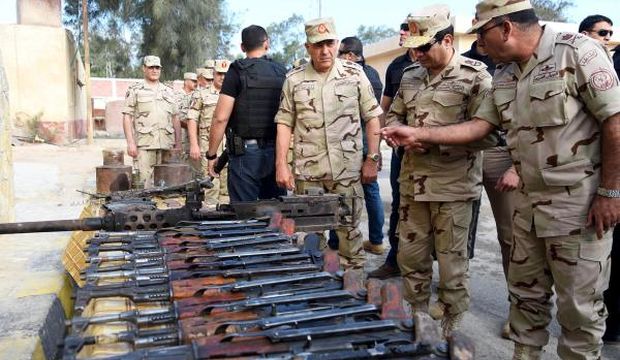
A handout picture made available by the Office of the Egyptian President shows Egyptian President Abdel-Fattah El-Sisi (C) inspecting weapons allegedly captured from militants, during his official visit following unprecedented attacks in North Sinai, Egypt, on July 4, 2014. (EPA/Office of the Egyptian President/HO)
Cairo, Asharq Al-Awsat—New terror legislation expected to be approved by Egyptian President Abdel-Fattah El-Sisi later this week has stirred controversy among journalists and human rights activists in the country.
The new bill, which amends existing anti-terror laws, includes an article stipulating that “anyone who spreads news or information on terrorist operations, and which contradict information published by [official sources], will face a jail term of not less than two years . . . ”
The bill, which gives authorities wider powers and speeds up trials for those convicted of terror-related activities, has already been passed by Egypt’s Higher Judicial Council and must now await presidential approval.
Nasser Amin, a member of the government-affiliated National Council for Human Rights, called the new legislation a “catastrophe.”
He told Asharq Al-Awsat the new law had not been put forward before his organization, as it should be under Egypt’s constitution, and said its being approved by the Higher Judicial Council was unnecessary constitutionally—a move he believed was designed to give judicial “sheen” to the new legislation before it is approved by President Sisi.
Meanwhile, the Egyptian Journalists’ Union also slammed the legislation. In a press release on Sunday, the Union expressed its “absolute rejection of the new constraints which the anti-terror law places on the freedom of Egyptian journalism, and which clearly contravene the current Egyptian constitution.”
It called for an emergency meeting of its members on Monday.
Yehya Alash, the head of the Union, told Asharq Al-Awsat he believed the new bill could “put an end to the future of journalism in the country.”
“The [Egyptian Journalists’] Union’s Council will discuss the matter today [Monday], and one of our options [in dealing with it] will be to call on the editors-in-chief, board members, shareholders . . . [of newspapers] to counter this attempt to take advantage of journalism in Egypt and its freedoms,” he said.
This comes as Egypt faces a growing terrorist threat across the country, especially in the restive North Sinai province where last week a group allied to the Islamic State of Iraq and Syria (ISIS) killed at least 50 people in coordinated attacks on army checkpoints and a police station.
The country has now launched airstrikes against the group, which calls itself Sinai Province. Last week Prime Minister Ibrahim Mahlab said the country was now in a “state of war.”
The attack came just two days after the assassination of Egypt’s top judicial official, prosecutor-general Hisham Barakat, who was killed after a bomb targeted his motorcade in central Cairo.
During Barakat’s funeral, President Sisi said the country needed to amend its terror laws and speed up prosecution for those convicted of terror-related crimes.
“The hand of justice is chained by [current] laws. We will not wait. We will amend these laws,” Sisi said.
